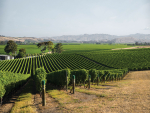Detailed chemical analysis of Pinot Noir grapes grown in controlled microclimates suggests higher temperatures during ripening can influence metabolites in potentially positive and negative ways.
Dr Romy Moukarzel, of Lincoln University, is part of a research team conducting the first study of how temperature changes during ripening affect individual amino acids and phenolics in Pinot Noir grapes.
Romy says modifying the microclimate when the grapes ripened has allowed them to explore the impacts of higher temperatures on the accumulation of primary and secondary metabolites, providing insights into expected impacts on Pinot Noir from climate changes. Romy says the main goal of the research has been to investigate how such temperature changes in controlled environments impacted Pinot noir grape yield and quality. A complex number of environmental and biological factors determine the concentration of metabolites in grapes and “we are just starting to unravel these interactions in the context of climate change”.
Higher temperatures increased amino acids, “indicating potential changes to the characteristics of Pinot Noir, since amino acid profiles may be closely linked to a wine’s aroma”, Romy says. In some cases, this could be positive as “having high specific amino acids at early stages of fermentation can produce wines with good complexity and mouthfeel”.
On the flip-side, any change in amino acid composition could influence yeast growth and fermentation and ultimately impact wine quality, she adds. Increased temperatures were also shown to have a negative effect on anthocyanins. These influence wine colour and the change “could be detrimental to perceived wine quality in warming climates”.
Romy says that the warmer conditions did not affect the yield of the grapes or cause water loss, as the grapevines were irrigated, meaning water was not a limiting factor. “Future experiments are needed to assess amino acid accumulations at high temperatures in combination with water stress.”
The study has been carried out at Lincoln University as part of a Ministry of Business, Innovation and Employment funded programme led by the Bragato Research Institute. The Lincoln team includes Romy, Dr Amber Parker, Dr Olaf Schelezki and Professor Brian Jordan.














